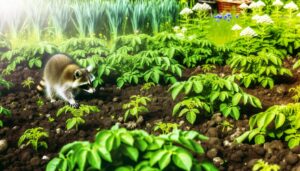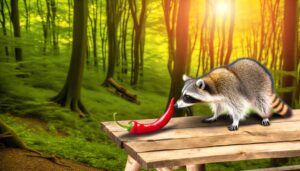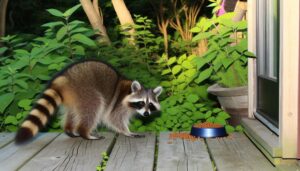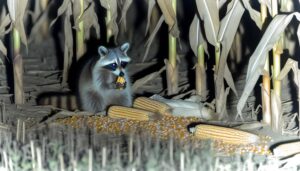Do Raccoons Eat Sunflower Seeds?
Raccoons, as opportunistic omnivores, do consume sunflower seeds. Their diet includes a wide range of plant-based and animal-based foods, with seeds being a notable component.
The high nutritional value of sunflower seeds, rich in fats and proteins, makes them an attractive energy source for raccoons. Empirical observations have confirmed that raccoons actively seek out and consume sunflower seeds when available.
Their nocturnal foraging behavior enables them to exploit various food sources efficiently. To discover effective methods for protecting bird feeders and gardens from raccoon interference, further insights are essential.
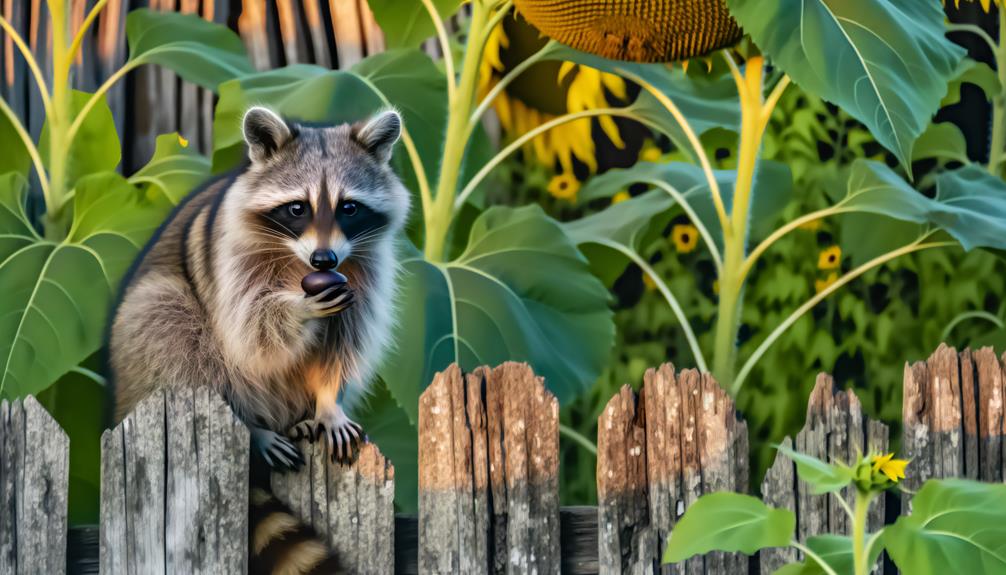
Key Takeaways
- Raccoons consume sunflower seeds due to their high nutritional value.
- Sunflower seeds provide essential fats and proteins crucial for raccoons' energy needs.
- Observational studies confirm raccoons actively seek out and consume seeds.
- Raccoons' dietary flexibility makes sunflower seeds a preferred food choice.
- Seeds contribute to fat storage and muscle maintenance for raccoons.
Raccoon Dietary Habits
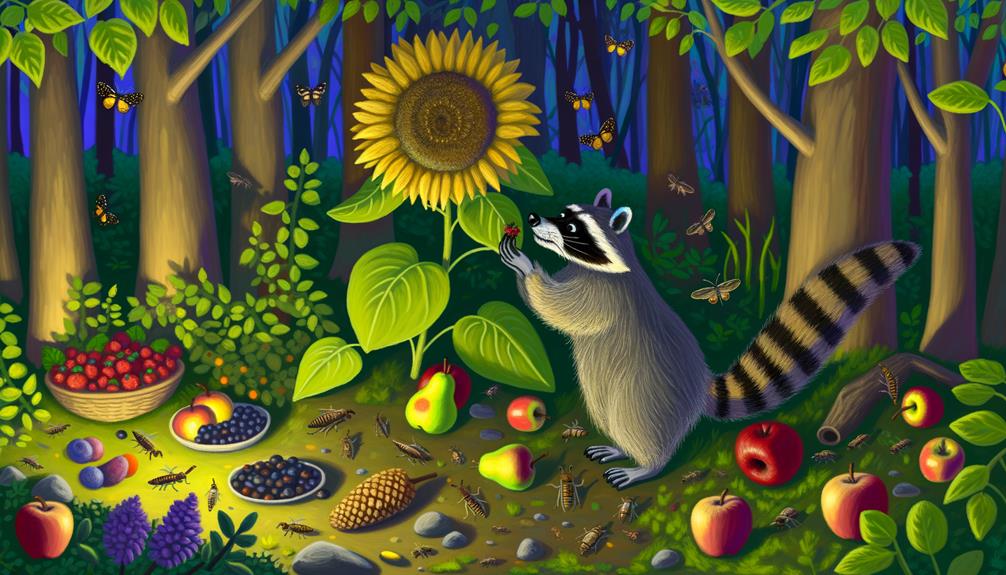
Raccoons (Procyon lotor) exhibit omnivorous dietary habits, consuming a diverse array of food sources including fruits, nuts, insects, small vertebrates, and human food waste. This dietary flexibility allows raccoons to thrive in various environments, from urban areas to dense forests.
Studies have shown that raccoons possess highly developed forepaws, enabling them to manipulate and process a wide range of food items. Seasonal variations also influence their dietary preferences, with a higher intake of fruits and nuts during autumn to build fat reserves for winter.
Additionally, raccoons' nocturnal foraging behavior is well-documented, maximizing their ability to exploit different food sources while minimizing competition and predation risks. Their opportunistic feeding strategies highlight their adaptability and survival prowess.
Common Foods for Raccoons
Given their omnivorous nature and adaptability, raccoons frequently consume a variety of common foods such as fruits, nuts, insects, amphibians, and small mammals. These generalist feeders exhibit a highly opportunistic diet, which allows them to thrive in diverse environments. Observations have consistently shown them scavenging in both urban and rural areas, exploiting available resources efficiently.
| Food Type | Examples | Notes |
|---|---|---|
| Fruits | Berries, apples, grapes | Seasonal availability influences diet |
| Nuts | Acorns, walnuts, pecans | High in fats, essential for winter survival |
| Insects | Beetles, caterpillars, ants | Protein-rich, abundant in warm months |
| Amphibians | Frogs, salamanders | Common in wet, marshy habitats |
| Small Mammals | Mice, voles, shrews | Supplement diet, especially in scarcity |
This dietary flexibility is a vital factor in their ecological success, enabling them to exploit a wide range of food sources.
Nutritional Value of Sunflower Seeds
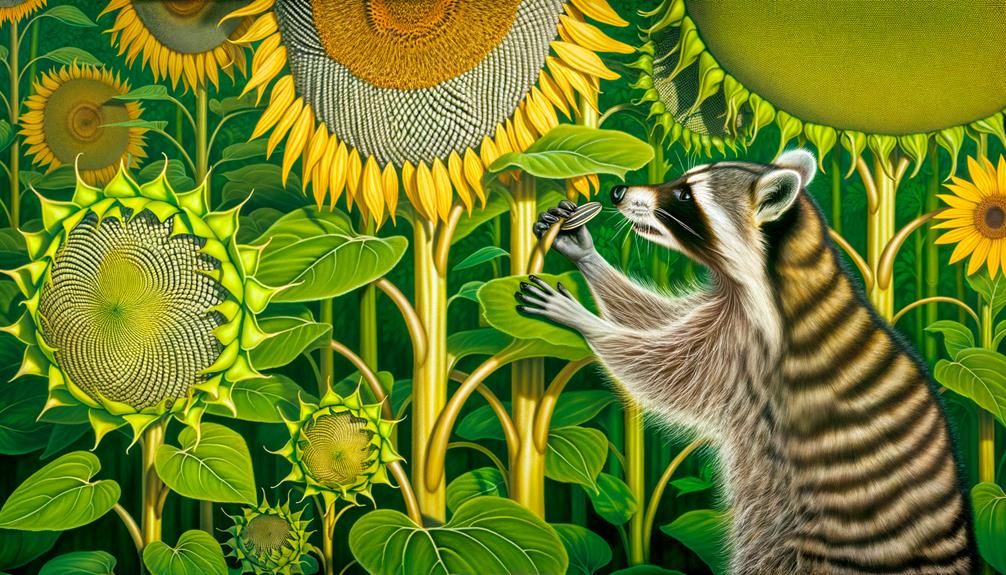
Sunflower seeds are rich in essential nutrients, including proteins, healthy fats, vitamins, and minerals.
Scientific studies have demonstrated that these seeds offer significant health benefits, such as improved cardiovascular health and enhanced immune function.
Understanding the nutritional profile of sunflower seeds is essential for evaluating their potential role in the diet of raccoons.
Essential Nutrients Overview
Packed with essential nutrients, sunflower seeds offer a rich source of vitamins, minerals, and healthy fats that are crucial for both human and animal diets. These seeds are particularly noted for their detailed nutritional profile, which includes:
- Vitamins: Sunflower seeds are abundant in Vitamin E, an antioxidant that supports immune function and skin health.
- Minerals: High levels of magnesium, phosphorus, and selenium are present, which are essential for metabolic processes and bone health.
- Healthy Fats: They contain significant amounts of polyunsaturated fats, including linoleic acid, which are advantageous for cardiovascular health.
Such nutrients make sunflower seeds a valuable addition to a balanced diet, reflecting their role in sustaining physiological and biochemical functions.
Health Benefits Summary
The nutritional composition of sunflower seeds translates into numerous health benefits, making them a significant component of a nutritious diet.
Rich in essential fatty acids, particularly linoleic acid, sunflower seeds contribute to cardiovascular health by reducing cholesterol levels.
They are also an excellent source of Vitamin E, a potent antioxidant that helps combat oxidative stress and inflammation.
The presence of magnesium aids in bone health and metabolic functions, while selenium supports thyroid function and immune system efficacy.
Additionally, sunflower seeds contain significant amounts of protein and fiber, promoting satiety and digestive health.
Empirical studies corroborate these benefits, illustrating sunflower seeds as a valuable dietary inclusion for enhancing overall health and preventing chronic disease.
Do Raccoons Like Seeds?
Analyzing raccoon dietary preferences reveals that these omnivorous mammals often consume a variety of plant-based foods, including seeds.
The high nutritional value of seeds, especially concerning protein and fat content, makes them an attractive food source for raccoons.
Observations of raccoon foraging behavior indicate a propensity for opportunistic feeding, where seeds may be readily consumed if available within their habitat.
Raccoon Dietary Preferences
In examining the dietary preferences of raccoons, it is evident that seeds, including sunflower seeds, are a part of their varied and opportunistic diet. Raccoons exhibit a broad spectrum of feeding behaviors, adapting to available resources in various environments.
Studies have documented their consumption patterns, showing a marked preference for certain food items. Importantly, seeds are frequently observed in their diet for the following reasons:
- Availability: Seeds are often abundant in many habitats, making them an accessible food source.
- Nutrient Density: Seeds, including sunflower seeds, are rich in fats and proteins, which are essential for raccoon energy needs.
- Versatility: The ability to consume a wide range of seeds allows raccoons to thrive in diverse ecosystems.
Nutritional Value Considerations
Given their high fat and protein content, sunflower seeds provide a substantial nutritional benefit that supports the energy requirements of raccoons. Rich in essential fatty acids and amino acids, these seeds fulfill an important role in meeting the metabolic demands of these omnivorous mammals.
Studies indicate that the lipid content in sunflower seeds can enhance overall caloric intake, thereby contributing to fat storage, which is crucial during periods of food scarcity. Additionally, the protein components aid in muscle maintenance and repair.
Empirical evidence suggests that raccoons exhibit a preference for energy-dense foods, which aligns with the nutritional profile of sunflower seeds. As a result, the consumption of these seeds can be considered advantageous for raccoons from a dietary perspective.
Foraging Behavior Insights
Observational studies and field experiments have consistently demonstrated that raccoons exhibit a marked preference for seeds, including sunflower seeds, as components of their foraging strategies.
This preference is evidenced by several key behaviors:
- Dietary Analysis: Examination of raccoon scat frequently reveals the presence of seed matter, indicating their consumption.
- Behavioral Observations: Raccoons have been noted to actively seek out bird feeders and other sources of seeds, showcasing their opportunistic foraging behavior.
- Experimental Evidence: Controlled experiments have shown that raccoons will choose sunflower seeds over other food options when available, underscoring a specific preference.
These findings highlight the adaptability and dietary flexibility of raccoons, further explaining their success in diverse habitats.
Observations in the Wild
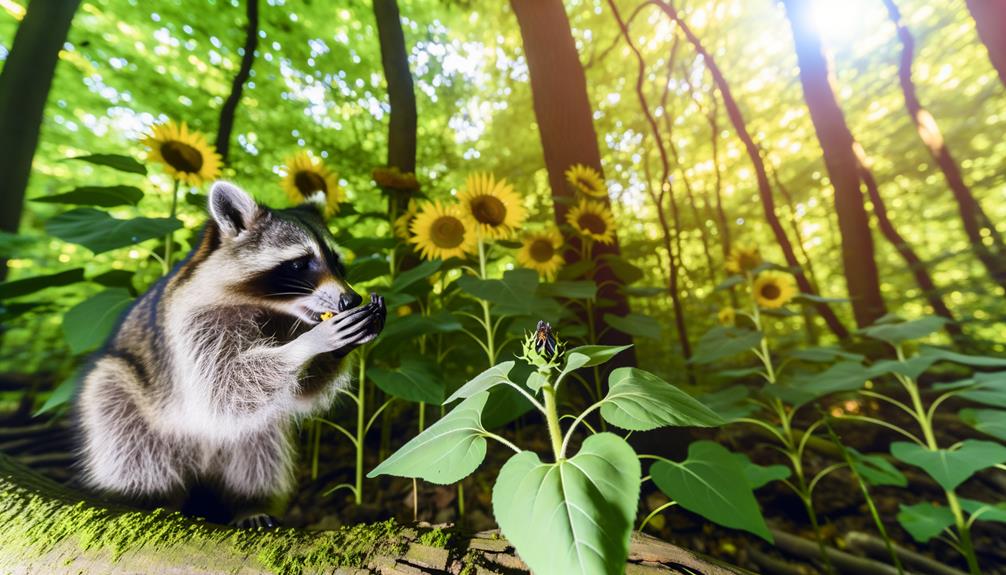
Field studies have consistently documented raccoons foraging for and consuming sunflower seeds in various natural habitats. Observations indicate that raccoons exhibit a preference for areas where sunflower seeds are abundant. Behavioral patterns include nocturnal activity, utilizing their dexterous front paws to extract seeds from flower heads or feeders. Additionally, raccoons have been observed caching seeds for later consumption, suggesting an adaptive strategy for resource management. Below is a summary of key observations:
| Observation Location | Foraging Behavior | Seed Consumption Rate |
|---|---|---|
| Forest Edge | Nocturnal foraging | High |
| Urban Parks | Opportunistic | Moderate |
| Agricultural Fields | Systematic search | High |
These findings underscore the raccoon's adaptability and opportunistic feeding behaviors.
Protecting Bird Feeders
Efficient strategies to protect bird feeders from raccoon interference involve both mechanical deterrents and behavioral adaptations. Research indicates that raccoons are highly dexterous and persistent, necessitating robust solutions. Evidence-based approaches include:
- Use of Baffles: Install cylindrical or cone-shaped baffles on feeder poles to obstruct raccoon access. Observations demonstrate a significant reduction in feeder tampering.
- Feeder Placement: Position feeders at least 10 feet from trees or structures, minimizing raccoon jumping capabilities, as supported by behavioral studies.
- Timed Feeding: Implement time-restricted feeding schedules, removing feeders during nocturnal hours when raccoons are most active, hence decreasing the likelihood of interference.
These methods, supported by empirical data, offer effective means to safeguard bird feeders from raccoon activity.
Safeguarding Your Garden

Implementing strategic measures to safeguard your garden from raccoon incursions involves a combination of physical barriers and habitat modifications, as evidenced by numerous field studies. Robust fencing, extending at least 12 inches underground, deters raccoons from burrowing.
Additionally, electric fencing has proven effective, delivering mild deterrent shocks. Habitat modifications, such as removing accessible food sources and securing garbage, further mitigate attraction. Studies indicate that reducing shelter opportunities, like sealing off crawl spaces, decreases raccoon presence.
Motion-activated lights and sprinklers provide additional deterrence by exploiting raccoons' aversion to sudden stimuli. These evidence-based strategies, when employed synergistically, decrease raccoon-related garden disruptions, fostering a more secure and thriving horticultural environment.
Humane Deterrence Methods
Incorporating humane deterrence methods, such as ultrasonic devices and non-toxic repellents, offers an ethical approach to managing raccoon activity in gardens.
Empirical studies indicate that these strategies can be effective without causing harm to the animals.
Here are three recommended methods:
- Ultrasonic Devices: These emit high-frequency sounds that are unpleasant to raccoons but inaudible to humans, thereby deterring them humanely.
- Motion-Activated Sprinklers: Activated by the presence of raccoons, these sprinklers deliver a harmless burst of water, encouraging raccoons to avoid the area.
- Natural Repellents: Substances such as capsaicin-based sprays have been evidenced to deter raccoons without toxic effects, making them a safe option.
Conclusion
To conclude, raccoons exhibit omnivorous dietary habits, consuming a diverse array of foods, including sunflower seeds. The nutritional value of sunflower seeds, abundant in fats and proteins, makes them an appealing food source.
Observations in the wild confirm their preference for seeds, creating difficulties for bird feeders and gardens. Employing humane deterrence methods can protect these areas.
The insatiable hunger of raccoons for sunflower seeds highlights the significance of comprehending and reducing their foraging behaviors to uphold ecological balance.

